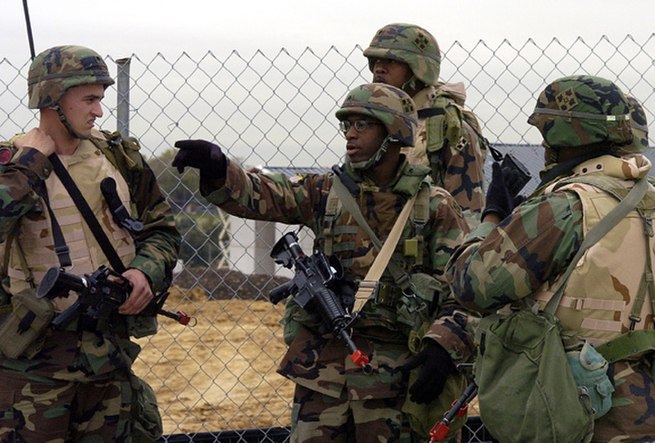
Main Difference
The main difference between Army and Military is that the Army is a military branch of service primarily focused on ground warfare and Military is a organized body primarily tasked with preparing for and conducting war
-
Army
An army (from Latin arma “arms, weapons” via Old French armée, “armed” (feminine)) or land force is a fighting force that fights primarily on land. In the broadest sense, it is the land-based military branch, service branch or armed service of a nation or state. It may also include aviation assets by possessing an army aviation component. In certain states, the term army refers to the entire armed forces (e.g., People’s Liberation Army). Within a national military force, the word army may also mean a field army.
In several countries, the army is officially called the Land Army to differentiate it from an air force called the Air Army, notably France. In such countries, the word “army” on its own retains its connotation of a land force in common usage. The current largest army in the world, by number of active troops, is the People’s Liberation Army Ground Force of China with 1,600,000 active troops and 510,000 reserve personnel followed by the Indian Army with 1,129,000 active troops and 960,000 reserve personnel.
By convention, irregular military is understood in contrast to regular armies which grew slowly from personal bodyguards or elite militia. Regular in this case refers to standardized doctrines, uniforms, organizations, etc. Regular military can also refer to full-time status (standing army), versus reserve or part-time personnel. Other distinctions may separate statutory forces (established under laws such as the National Defence Act), from de facto “non-statutory” forces such as some guerrilla and revolutionary armies. Armies may also be expeditionary (designed for overseas or international deployment) or fencible (designed for – or restricted to – homeland defence)
-
Military
A military is a heavily-armed highly-organised force primarily intended for warfare, also known as an armed force, typically officially authorized and maintained by a sovereign state, with its members identifiable by their distinct military uniform. It may consist of one or more military branches such as an Army, Navy, Air Force and in certain countries, Marines and Coast Guard. The main task of the military is usually defined as defence of the state and its interests against external armed threats. Beyond warfare, the military may be employed in additional sanctioned and non-sanctioned functions within the state, including internal security threats, population control, the promotion of a political agenda, emergency services and reconstruction, protecting corporate economic interests, social ceremonies and national honor guards. For a nation’s military may function as a discrete subculture within a larger civil society, through the development of separate infrastructures, which may include housing, schools, utilities, logistics, health and medical, law, food production, finance and banking.
In broad usage, the terms “armed forces” and “military” are often treated as synonymous, although in technical usage a distinction is sometimes made in which a country’s armed forces may include both its military and other paramilitary forces. There are various forms of irregular military forces, not belonging to a recognized state; though they share many attributes with regular military forces, they are less often referred as simply “military”.
The profession of soldiering as part of a military is older than recorded history itself. Some of the most enduring images of classical antiquity portray the power and feats of its military leaders. The Battle of Kadesh in 1274 BC was one of the defining points of Pharaoh Ramses II’s reign, and his monuments commemorate it in bas-relief. A thousand years later, the first emperor of unified China, Qin Shi Huang, was so determined to impress the gods with his military might that he had himself buried with an army of terracotta soldiers.
The Romans paid considerable attention to military matters, leaving to posterity many treatises and writings on the subject, as well as a large number of lavishly carved triumphal arches and victory columns.
-
Army (noun)
A large, highly organized military force, concerned mainly with ground (rather than air or naval) operations.
“The army was sent in to quell the uprising.”
-
Army (noun)
Used absolutely for that entire branch of the armed forces.
“The army received a bigger share of this year’s budget increase than the navy or air force.”
-
Army (noun)
The governmental agency in charge of a state’s army.
“The army opposed the legislature’s involvement.”
-
Army (noun)
A large group of people working toward the same purpose.
“It took an army of accountants to uncover the fraud.”
-
Army (noun)
A large group of social animals working toward the same purpose.
“Our house is being attacked by an army of ants.”
-
Army (noun)
Any multitude.
“On sunny days the beaches draw armies of tourists of all kinds.”
-
Military (adjective)
Characteristic of members of the armed forces.
“Chelsea Manning was dishonorably discharged from all military duties.”
-
Military (adjective)
Relating to armed forces such as the army, marines, navy and air force (often as distinguished from civilians or police forces).
“If you join a military force, you may end up killing people.”
-
Military (adjective)
Relating to war.
-
Military (adjective)
Relating to armies or ground forces.
-
Military (noun)
Armed forces.
“He spent six years in the military.”
-
Military (noun)
U.S. armed forces in general, including the Marine Corps.
“It’s not the job of the military to make policy.”
-
Military (adjective)
relating to or characteristic of soldiers or armed forces
“he organized his shows with military precision”
“the build-up of military activity”
-
Military (noun)
the armed forces of a country
“most militaries remain subordinate to civilian authorities”
“as a young man he joined the military and pursued a career in the Army”
